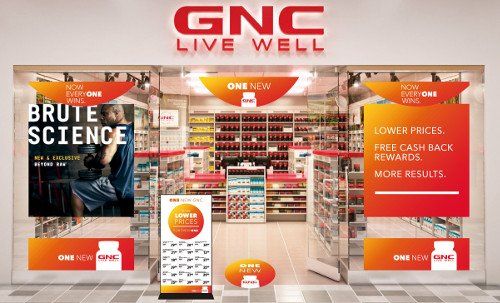GNC Drastically Changing Store Pricing Structure
On December 28th, the company will close all of its stores for one day in order to implement the changes, which include doing away with the company’s “gold card” member system and introducing a loyalty program.
Photo from GNC

Health and nutrition retail giant GNC is making some radical changes to its business strategy in an effort to reverse declining sales. On December 28th, the company will close all of its stores for one day in order to implement the changes, which include doing away with the company’s “gold card” member system and introducing a loyalty program.
GNC’s chief marketing officer, Jeff Hennion, told Nutritional Outlook that GNC is making these changes based on feedback from its customers. “I think that the biggest challenge we’ve had is people either thinking that our prices were too high or too complicated,” he said.
As part of the gold-card program, for instance, customers were able to purchase a gold card in order to reach “membership” status, which then made them eligible for discounted member pricing. As a result, Hennion said, price tags were confusing to customers, reflecting not only member and non-member pricing but also any sales prices. “You could see three or four different prices on a tag,” he says, which ultimately confused some customers.
Hennion said GNC conducted two years’ worth of extensive research to understand what its customers’ biggest frustrations were-and to make changes accordingly.
To start, there will no longer be member prices. “On the 29th, there will no longer be a gold card,” Hennion said. “There will no longer be member prices and non-member prices. Our prices are going to be lower, and everyone will pay the same price. There’s no need to buy a gold card to get the best price in our store.”
In addition, GNC is adding something Hennion said it’s been missing: a loyalty program for customers. “The other piece of feedback we got from our customers is that, in this day and age, people who are loyal customers expect some kind of loyalty reward, and so we’re launching a new points-based, free, cash-back rewards program,” Hennion said. “So when you spend a dollar, you get a point, and at 150 points, you get a $5 rewards certificate. And there are lots of other ways to earn points, as well.” He added that the company is also launching an app that ties into all of these programs and plans to introduce numerous product innovations in 2017.
Every one of GNC’s 4400 U.S. stores, both franchised and company-owned, will close on December 28th to accommodate both physical changes to the store and sales-associate training on the new programs and business strategy. The physical changes will include changing “every single price tag,” Hennion said, plus changing signage and the store’s look. Regarding the training, “we’re using that day to train our associates on how the new GNC works, how they should be working with our customers and creating that relationship with the customer about solving their needs rather than worrying about selling them a gold card,” he said.
Part of GNC’s biggest challenge moving forward will be communicating these new and improved changes to its current customers, as well as any former customers. Hennion said that it is additionally challenging to change customers’ minds simply because GNC is so well known.
“The challenge for us is that we have 82% awareness in the U.S.,” he said. “So, people have a significant knowledge of GNC, and in some respects, that’s a challenge because if people had decided that we weren’t for them or we were no longer for them, that caused us problems. And so, our goal is, how do we tell people as quickly as possible that this is completely changed and that we’ve listened to their feedback?” To achieve this, he said, GNC is launching its biggest marketing campaign to date, which will culminate in an ad during the Super Bowl next year.
Also read:
Retailers Talk Challenges, Opportunities for Dietary Supplements in 2016
GNC’s Department of Justice Deal Is a “Fair Deal,” One Expert Says
GNC’s New Mandatory Supplier-GMP Initiative: As GNC Goes, So Goes Industry?
Jennifer Grebow
Editor-in-Chief
Nutritional Outlook magazine
jennifer.grebow@ubm.com
HHS announces restructuring plans to consolidate divisions and downsize workforce
Published: March 27th 2025 | Updated: March 27th 2025According to the announcement, the restructuring will save taxpayers $1.8 billion per year by reducing the workforce by 10,000 full-time employees and consolidating the department’s 28 divisions into 15 new divisions.











